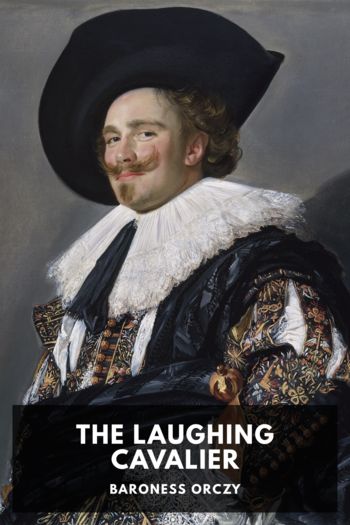The Laughing Cavalier, Baroness Orczy [the beginning after the end read novel TXT] 📗

- Author: Baroness Orczy
Book online «The Laughing Cavalier, Baroness Orczy [the beginning after the end read novel TXT] 📗». Author Baroness Orczy
“Tumult? Papist baiting? Was there really any Papist baiting this night? Ah! these foreign adventurers do fill our peaceful city with their noise.”
In the Dam Straat the fog and the darkness reigned unchallenged. The second torch lay extinguished on the ground, trampled out under the heel of a heavy boot. And in the darkness three men were busy readjusting their mantles and trying to regain possession of their hats.
“A very unprofitable entertainment,” growled Socrates.
“Total darkness, not a soul in sight, and cold! fit to chill the inner chambers of hell,” assented Pythagoras.
“And no chance of adding anything to the stock of three guilders which must suffice us for tonight,” concluded Diogenes airily.
He was carefully wiping the shining blade of Bucephalus with the corner of Pythagoras’ mantle.
“Verrek jezelf! and what the d⸺l?” queried the latter in a high falsetto.
“My mantle is almost new,” said Diogenes reproachfully; “thou would’st not have me soil it so soon?”
“I have a hole in my head fit to bury those three guilders in,” murmured Socrates, with a sigh.
“And I a blow in the stomach which has chilled me to the marrow,” sighed Pythagoras.
“And I a bruised shoulder,” laughed Diogenes, “which hath engendered an unquenchable thirst.”
“I wouldn’t sell my thirst for any money this night,” assented Pythagoras.
“To the Lame Cow, then, O Pythagoras, and I’ll toss thee for the first drink of hot ale.”
“Ugh! but my head feels mightily hot and thick,” said Socrates, somewhat huskily.
“Surely thou canst walk as far as the Lame Cow?” queried Pythagoras, anxiously.
“I doubt me,” sighed the other.
“Ale!” whispered Diogenes, encouragingly; “warm, sparkling, spicy ale!”
“Hm! hm!” assented the wounded man feebly.
“Easy! easy, my friend,” said Diogenes, for his brother philosopher had fallen heavily against him.
“What are we to do?” moaned Pythagoras, in his dulcet tones. “I have a thirst … and we cannot leave this irresponsible fool to faint here in the fog.”
“Hoist him up by the seat of his breeches, then on to my back,” retorted Diogenes lightly. “The Lame Cow is not far, and I too have a thirst.”
Socrates would have protested. He did not relish the idea of being tossed about like a bale of goods on his friend’s back. But he could only protest by word of mouth, to which the others paid no heed; and when he tried to struggle he rolled, dizzy and faint, almost to the ground.
“There’s nothing for it,” piped Pythagoras with consummate philosophy. “I couldn’t carry him if I tried.”
Diogenes bent his broad back and rested his hands on his thighs, getting as firm hold of the slippery ground as he could. Socrates for the moment was like a helpless log. There was much groping about in the darkness, a good deal of groaning, and a vast amount of swearing. Socrates had, fortunately, not fainted, and after a little while was able to settle down astride on his friend’s back, his arms around the latter’s neck, Pythagoras giving vigorous pushes from the rear.
When Diogenes, firmly grasping the wounded man’s legs, was at last able to straighten himself out again, and did so to the accompaniment of a mighty groan and still more mighty oath, he found himself confronted by two lanterns which were held up within a few inches of his nose.
“Dondersteen!” he ejaculated loudly, and nearly dropped his half-conscious and swaying burden on the ground.
“What is it now, Jakob?” queried a woman’s voice peremptorily.
“I cannot see clearly, lady,” replied one of the lantern-bearers—“two men I think.”
“Then do thy thoughts proclaim thee a liar, friend,” said Diogenes lightly; “there are three men here at this lady’s service, though one is sick, the other fat, and the third a mere beast of burden.”
“Let me see them, Jakob,” ordered the woman. “I believe they are the same three men who …”
The lantern-bearers made way for the lady, still holding the lanterns up so that the light fell fully on the quaint spectacle presented by the three philosophers. There was Socrates perched up aloft, his birdlike face smeared with blood, his eyes rolling in their effort to keep open, his thin back bent nearly double so that indeed he looked like a huge plucked crow the worse for a fight, and perched on an eminence where he felt none too secure. And below him his friend with broad shoulders bending under the burden, his plumed hat shading his brow, his merry, twinkling eyes fixed a little suspiciously on the four figures that loomed out of the fog in front of him, his mocking lips ready framed for a smile or an oath, his hands which supported the legs of poor wounded Socrates struggling visibly toward the hilt of his sword. And peeping round from behind him the short, rotund form of Pythagoras, crowned with a tall sugar-loaf hat which obviously had never belonged to him until now, for it perched somewhat insecurely above his flat, round face, with the small, upturned nose slightly tinged with pink and the tiny eyes, round and bright as new crowns.
Undoubtedly the sight was ludicrous in the extreme, and the woman who looked on it now burst into a merry peal of laughter.
“O Maria! dost see them?” she said, turning to her companion, an elderly woman in sober black gown and coif of tinsel lace. “Hast ever seen anything so quaint?”
She herself was young, and in the soft light of the two lanterns appeared to the three philosophers to be more than passing fair.
“Socrates, thou malapert,” said Diogenes sternly, “take my hat off my head at





Comments (0)